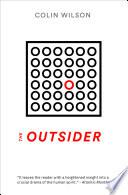Quotes from book
The Outsider

The Outsider is a 1956 book by English writer Colin Wilson.Through the works and lives of various artists – including H. G. Wells , Franz Kafka, Albert Camus, Jean-Paul Sartre, T. S. Eliot, Ernest Hemingway, Harley Granville-Barker , Hermann Hesse, T. E. Lawrence, Vincent van Gogh, Vaslav Nijinsky, George Bernard Shaw, William Blake, Friedrich Nietzsche, Fyodor Dostoyevsky and George Gurdjieff – Wilson explores the psyche of the Outsider, his effect on society, and society's effect on him.

“…the Outsider's problem is the problem of denial of self-expression.”
Source: The Outsider (1956), Chapter Four The Attempt to Gain Control

“The self-surmounter can never put up with the man who has ceased to be dissatisfied with himself.”
Source: The Outsider (1956), p. 139

“The individual begins that long effort as an Outsider; he may finish it as a saint.”
Source: The Outsider (1956), Chapter Nine, Breaking the Circuit, final sentence

“The Outsider has his proper place in the Order of Society, as the impractical dreamer.”
Source: The Outsider (1956), Chapter Three, The Romantic Outsider

“What can characterize the Outsider is a sense of strangeness, or unreality.”
Source: The Outsider (1956), Chapter one, The Country of the Blind

It is still a question of self-expression.
Source: The Outsider (1956), Chapter Four The Attempt to Gain Control

Source: The Outsider (1956), Chapter one, The Country of the Blind, referencing a quote by Desiderius Erasmus.
Context: He alone is aware of the truth, and if all men were aware of it, there would be an end of life. In the country of the blind, the one-eyed man is king. But his kingship is kingship over nothing. It brings no powers and privileges, only loss of faith and exhaustion of the power to act. Its world is a world without values.

Source: The Outsider (1956), p. 77
Context: Considered as a whole, Hesse's achievement can hardly be matched in modern literature; it is the continually rising trajectory of an idea, the fundamentally religious idea of how to 'live more abundantly'. Hesse has little imagination in the sense that Shakespeare or Tolstoy can be said to have imagination, but his ideas have a vitality that more than makes up for it. Before all, he is a novelist who used the novel to explore the problem: What should we do with our lives? The man who is interested to know how he should live instead of merely taking life as it comes, is automatically an Outsider.

“The Outsider's miseries are the prophet's teething pains.”
Source: The Outsider (1956), Chapter Four The Attempt to Gain Control
Context: The Outsider's miseries are the prophet's teething pains. He retreats into his room, like a spider in a dark corner; he lives alone, wishes to avoid people.

Source: The Outsider (1956), Chapter Eight, The Outsider as a Visionary